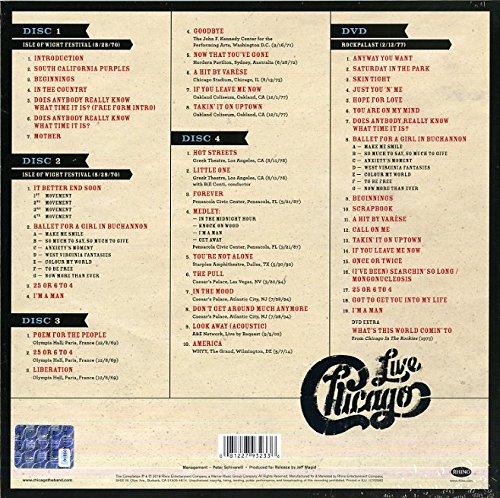https://www.varesesarabande.com/product ... eated_link
https://www.barnesandnoble.com/w/the-ve ... 0206747089
https://www.amazon.com/Very-Best-Peter- ... ter+cetera
 THE VERY BEST OF PETER CETERA
THE VERY BEST OF PETER CETERA
Peter Cetera ruled the airwaves with a string of hit singles as the last half of the ‘80s gave way to the ‘90s -- many of which became contemporary standards. This lasting legacy had its humble beginnings some thirty years prior: at the age of twelve, the future singer/songwriter had his first moment in the spotlight when his accordion skills won first prize at a local talent show. His radio debut occurred when a recording of the show was broadcast the following week. Unfortunately, the Cetera family didn’t have an FM receiver at the time, so they had to wait awhile to enjoy that experience.
A few years later, Peter finally bought the instrument he had originally requested and was playing guitar in a few bands throughout his high school years. As the bassist for Kal David and The Exceptions, he made his vinyl debut in 1964 with a cover of The Clovers’ “Searchin’” backed with a Jackie DeShannon song, “Daydreaming Of You,” on Vee-Jay’s Tollie subsidiary. “Come On Home” / “Dancing Danny” would emerge nearly a year later, and while the single did little to improve the band’s -- or the floundering Vee-Jay’s -- fortunes, the a-side provided Cetera with his first writing credit.
Kal David decamped shortly thereafter and Peter and Marty Grebb kept the band busy doing studio work behind some of Vee-Jay’s legendary soul stars. Rebilled as The Exceptions, they were prolific in 1966: they released an EP entitled Rock ‘N’ Mass for the local Flair label, an excellent cover of Dick Campbell’s “Ask Me If I Care” for Mercury produced by Lou Reizner, and another 45 -- a Grebb original called “As Far As I Can See” backed with a cover of The Beach Boys’ “The Girl From New York City” -- for the legendary Quill label. This last single grabbed the attention of Capitol Records who reissued it the following year, but by then Marty Grebb had already joined The Buckinghams.
With Peter the only original member, the name was singularized to The Exception and two more singles for Capitol came and went. One evening, The Exception played the opening of a Chicago club, sharing the bill with The Big Thing, a band looking for a new bassist. Peter took the job. The Big Thing signed to Columbia and became Chicago Transit Authority, and one of the biggest selling acts of the ‘70s was born.
The seeds of Peter’s first solo album were sown at a time of waning success and big changes for Chicago.
Peter recently described the band’s music as the Seventies came to a close as “pseudo jazz,” and he was anxious to step away from it. In 1981, as the band took a brief hiatus after leaving their long-time label, Columbia, for Warner Bros.’ Full Moon imprint, he took the opportunity to record his self-titled debut. The uncharacteristically heavy “Livin’ In The Limelight” was produced as the first single, but its standing at pop radio failed to match its #6 placing on the Mainstream Rock listings. The label issued an edited version of “On The Line” before moving on to the promotion of Chicago 16. That album brought the band back to platinum status on the strengths of the Cetera and David Foster co-writes “Love Me Tomorrow” and Hard To Say I’m Sorry,” the latter which became the act’s second #1 pop hit after “If You Leave Me Now” -- another Cetera composition.
Chicago’s return to the airwaves and upper reaches of the Top 40 with songs primarily penned and sung by Peter Cetera led to him becoming the face of the band in videos aimed at an audience too young to know much about the act’s history.
It seemed to be the perfect time for Peter to re-launch a separate career, which would allow him time for a solo album in between Chicago releases. While that sort of arrangement was reaping big rewards for both Phil Collins and Genesis (as well as their record companies), the other members of Chicago, their management, and their label all balked at the idea. When presented with a document requiring a commitment to the band’s next album and tour, he agreed under the assumption that once those commitments were met, he would be allowed his solo turn. However, after the release and promotion of Chicago 17 and its four Top 20 singles, Peter was again asked to set aside his solo plans for the sake of the band, and this time it was he who balked. Faced with another ultimatum, he stood firm and his time with the band came to an end.
Shortly after his departure, Peter was approached by the producers of the upcoming Rocky IV to write the theme song, but the result ultimately went unused. When The Karate Kid 2 team approached him for a contribution, he made some changes to the lyric and “Glory Of Love” became the movie theme and a highlight of his new solo album. Cetera’s timing couldn’t have been better: the single and accompanying video that featured scenes from the movie were released in May, allowing time for radio and MTV to catch on just as advertisements for the film began to saturate all media outlets. When the Solitude/Solitaire album and the Karate Kid 2 movie were released within days of each other at the end of June, the single was already climbing up the Hot 100 on its way to a two-week stay at #1. To capitalize on the success, the label remixed “The Next Time I Fall,” Peter’s duet with Amy Grant, and it too topped the Hot 100. While “Big Mistake” and “Only Love Knows Why” were extracted next, they didn’t match the peaks of their predecessors. Solitude/Solitaire was an undeniable success, peaking at #23 on the Billboard album chart, receiving gold record certification within months of its release, and continuing to sell steadily enough to reach platinum status fifteen years later. Adding to the prestige, “Glory Of Love” received nominations for an Academy Award, a Golden Globe, and a Grammy. “The Next Time I Fall” also garnered a Grammy nod.
A true rarity in his canon is “Stay With Me,” Peter’s contribution to a Japanese film entitled Princess Of The Moon. Peter and his good friend, Bobby Caldwell (who also penned “The Next Time I Fall”), co-produced the track, but with no U.S. distribution of the film, the song was never released in the States. The single version -- issued only in Japan and Germany -- is included here, along with Peter’s ode to his daughter, “Daddy’s Girl,” which was featured on the flipside, and understandably remains a favorite of the artist.
For his next album, One More Story, Peter chose Patrick Leonard to co-produce. Leonard was an extremely hot commodity after his work on Madonna’s mega-platinum True Blue LP.
“One Good Woman” was released in July 1988, preceding the album by a few weeks, and was enthusiastically embraced at pop radio, ultimately climbing to #4. Taking note of the lyric “You could read me like a book, like a fortune teller,” it should come as no surprise to learn that the song was originally commissioned for the film Big, but inexplicably didn’t make the final cut. 1988 was a year of many changes in pop music, which may be why the next single, “Best Of Times,” didn’t find an audience, but the album track “Save Me” is one of Peter’s most recognizable songs thanks to its later use as the opening theme to Baywatch.
It would be six months before his next record began to blanket the airwaves. Another film-related song and another duet, “After All” was the love theme from Chances Are, a romantic comedy starring Cybill Shepherd and Robert Downey, Jr. Teamed up with the legendary Cher, the power of the two iconic voices together proved too strong to be denied and the ballad became a Top 10 hit and Adult Contemporary chart-topper, despite the underwhelming reception the film received at the box office.
Taking time off to adjust to some major changes in his life, three years passed before World Falling Down hit the shops amid the rise of hip-hop and the glory days of grunge. The album brought Bucks Fizz producer Andy Hill into the collaborative fold and reunited Peter with Chicago producer David Foster. Accompanied by a beautiful video that included his daughter Claire, the album’s first single “Restless Heart” topped out at #35 on the Pop chart, but became Peter’s fifth and final number one at Adult Contemporary. “Feels Like Heaven,” a duet with busy label-mate Chaka Khan, and “Even A Fool Can See” followed but had little impact on the Hot 100 despite being huge A/C hits.
The Full Moon label having finally folded, Peter and Warner Bros. parted ways shortly thereafter.
As an original member of Chicago, Peter was inducted into the Rock And Roll Hall Of Fame in 2016 and the Songwriters Hall Of Fame in 2017, and continues to perform to rapturous crowds throughout the world. He is often surprised to discover that the songs of his 50+-year career still mean so much to so many.
--Larry R Watts w/Bill Pitzonka
(With thanks to David A Thimsen. Special thanks to Peter Cetera for his time and remembrances.)






